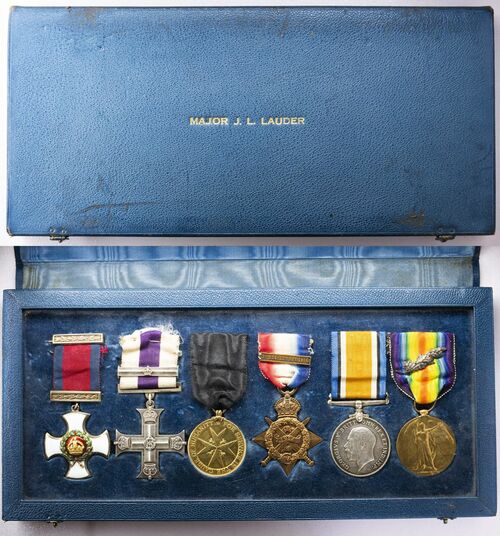
Auction: 23113 - Orders, Decorations and Medals - e-Auction
Lot: 571
The remarkable 'Wittenberg Camp typhus outbreak 1915' D.S.O., M.C. & Bar and gold St John Lifesaving group of six awarded to Lieutenant-Colonel J. La F. Lauder, Royal Army Medical Corps
Lauder was captured in August 1914 and rendered remarkable service - being decorated - at Wittenberg Prisoner of War Camp during the typhus outbreak amid squalid conditions in the Spring of 1915; for those actions he earned the D.S.O., the St John Medal and a 'mention'
Subsequently released from captivity and returned to the fold, Lauder added a brace of M.C.'s before War's end for tending the wounded in No Man's Land
Distinguished Service Order, G.V.R.; Military Cross, G.V.R., with Second Award Bar; Order of St. John Lifesaving Medal, gold (Presented to Captain J. La Fayette Lauder. D.S.O. R.A.M.C. 1916.); 1914 Star, clasp (Lieut. J. La F. Lauder. R.A.M.C.); British War and Victory Medals, with M.I.D. oak leaves (Lt. Col. J. La F. Lauder.), good very fine, housed in a glazed fitted leather case, the lid blocked 'Major J. L. Lauder' (6)
D.S.O. London Gazette 18 April 1916, in a joint Citation with Captain A. C. Vidal:
His Majesty the King has been graciously pleased to appoint the undermentioned Officers to be Companions of the Distinguished Service Order, in recognition of their distinguished service and devotion to duty at the Camp at Wittenberg, Germany, during the Typhus
Epidemic which prevailed there from February to June, 1915.'
M.C. London Gazette11 December 1916:
For conspicuous gallantry and devotion to duty. He repeatedly with different parties of stretcher bearers searched the forward area under intense fire and brought in many wounded men. He has previously done fine work.'
Second Award Bar to M.C. London Gazette 8 March 1919:
'For conspicuous gallantry and marked devotion to duty during the operations, 14th to 20th October, 1918, as Officer in Charge Forward Bearer Officers of Brigades. He worked continuously, personally directing the evacuation of wounded from the Regimental Aid Posts east of Courtrai, wherever the casualties were heaviest, encouraging the bearers and setting a splendid example under heavy fire, to those under him.'
M.I.D. London Gazette 24 December 1917 & 10 January 1919 (Army Order 193 - an award for the events at Wittenberg POW Camp).
John La Fayette Lauder was born on 19 June 1889, a scion of the Lauder family who founded the famous La Fayette photography studio in Dublin, Ireland. Young Lauder qualified at Guy's Hospital and upon the outbreak of the Great War landed in France on 8 August 1914. Following the fierce actions of the following days, he was taken a Prisoner of War whilst serving with No. 4 Field Ambulance as part of the 1st Division on 26 August 1914. During 1915, a number of typhus outbreaks began in the POW Camps and it fell upon the shoulders of the Medical Officers to care for their men. So it was that he would be sent to Wittenberg Camp inside Germany, a place at which such an outbreak swept through. A report of a similar outbreak gives detail:
'The men lived, slept and fed in huts devoid of any furniture. They walked over each other in passing in and out. There they lay, sick, and later died cheek by jowl with their fellow prisoners. The overcrowding was such as I have never before seen or imagined anywhere.'
Lauder was sent in to assist in the treatment of the men and was lucky to come out of it alive, despite his being struck down with the dangerous infection. Eventually, he was rewarded with the D.S.O. - one of two for the outbreak, with a German Doctor earning and Iron Cross - and a 'mention'. Besides this he was also bestowed with the rare honour of the St John Lifesaving Medal in gold, the presentation of similar awards reported in the British Medical Journal of August 1916:
'At a Chapter-General of the Order of St. John of Jerusalem, on July 28th, the Sub-Prior, Lord Plymouth, presented gold life-saving Medals of the Order to Major Harold Edgar Priestley, C.M.G., R.A.M.C, and Captain Alan Vidal, D.S.O., R.A.M.C, in recognition of the gallantry displayed by them at the Wittenberg Camp.
Captain James La Fayette Lauder, D.S.O., R.A.M.C, was prevented by military duties abroad from attending to receive a similar medal.
The response to the appeal of Lady Parker of Waddington has been sufficient to enable her to arrange for a bronze relief to be designed by Mr. Arthur Walker, sculptor of the statue of Florence Nightingale in Waterloo Place and the fine relief of her ministering to the wounded in St. Paul's. The memorial will commemorate the names and services of Major W. B. Fry, Captain A. A. Sutcliff, and Captain Stephen Field, officers of the Royal Army Medical Corps, who died of typhus fever while attending on British soldiers suffering from the disease in Wittenberg Camp. Captain Lauder, it may be remembered, also suffered from the disease, but recovered.'
Returned to the Western Front, Lauder went on to earn a brace of M.M.'s and another 'mention' before War's end; that took his tally to a remarkable six awards for bravery during the Great War. He died on 18 July 1934.
Subject to 20% VAT on Buyer’s Premium. For more information please view Terms and Conditions for Buyers.
Sold for
£6,500
Starting price
£3000




